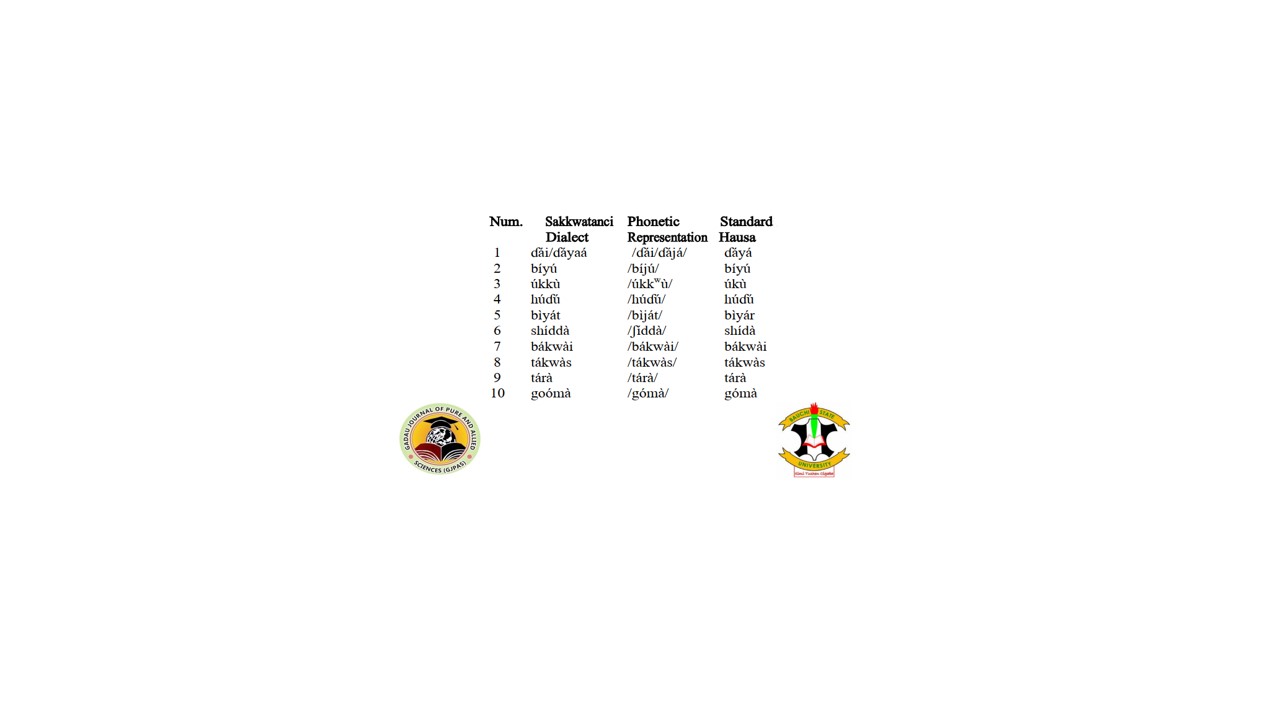Automated conversion of numeral to words in Hausa language
DOI:
https://doi.org/10.54117/gjpas.v2i2.100Keywords:
Algorithm, Automation, Conversion, Hausa Language, Numerical SystemAbstract
Working with cardinal numbers is undoubtedly an integral part of our everyday life, which tells us about quantity. They are used for instance, in numeracy lessons, on receipts, slips, tellers in banks, to represent figures on documents, to tell time and are often represented inconsistently. However, the words form representations are often inconsistent with the standard Hausa. Standard Hausa as compared to other languages such as Arabic and British English, the Numeric System is characterized by a multitude of concatenations as well as dialect variations which causes misinterpretations and confusion. Also, initial findings show that no such automation published work has been done specifically in the numerical system of Standard Hausa language. In order to fill the gap, this study proposed an algorithm for converting numerals to words for the numeric system of Hausa language automatically in standard practice. The aim of the study is to examine the effect of iteration and mapping structures algorithm for converting numeral to cardinal form in standard Hausa language. The algorithm has been tested on approximately one hundred million sequences of numbers produced accurate results. The results showed that our method is successful in automating conversion of numerals to words with a high precision.
References
Abdalla, U. A. (2005). Divergent Similarities: Culture, Globalization and Hausa Creative and Performing Arts. International Conference on Literature in Northern Nigeria, 4-5.
Africa: linguistik-und-sprachen/african-languages/hausa. (2015, February 10). Retrieved from Humboldt University of Berlin Web site: https://www.iaaw.hu-berlin.de
Agbeyangi, A. O., Eludiora, S. I., and Popoola, O. A. (2016, December). Web-Based Yorùbá Numeral Translation System. IAES International Journal of Artificial Intelligence (IJ-AI), Vol. 5(No. 4), pp. 127 – 134.
Bala, H. S. (2015). A Comparatve Study of Numeric Systems of English and Hausa Languages. Retrieved from Usmanu DanFodio University, Sokoto Website: oer.udusok.edu.ng
Ben, T. (2017). GameMaker: Studio 100 Programming Challenges. West Sussex: Apress.
Bunza, A. M. (2018). Mathematical Heritage In Hausa Number System: (A Proposal for TeachingMathematics using Nigerian Languages). Federal University, Gusau, Languages and Cultures. Gusau: University Research Center, Federal.
Eberhard, David, M., Gary, F. S., and Charles, D. F. (2021, October 20). Guides: how-many-languages, 24. (E. L. World, Producer, and Dallas, Texas: SIL International) Retrieved October 20, 2021, from SIL International Web site: http://www.ethnologue.com
Garba, F. A. (2018). Endangered Language In Nigeria: A Case Study Of Gera Language Of Bauchi State. Kenyatta University, Department of English and Linguistics. Kenyatta: Kenyatta University Libary. Retrieved October 21, 2021
Maikanti, S. (2014). Counting System In ‘Sakkwatanci’ Dialect Of Hausa Language. In Counting System Of Some Dialects Of Igbo, Hausa And Yorùbá (p. Department of Hausa). Ososami Road, Oke-Ado, Ibadan: Masterprint Publishers.
Mbah, E. E., Ndubuisi, O. A., and Ayegba, M. (2014). A Comparative Analysis of the Numerals and Counting Systems of Igbo and Igala. International Institute for Science, Technology and Education (IISTE), 61-65.
Migeod, F. W. (1914). A Grammar of the Hausa Language. London: KEGAN PAUL, TRENCH, TRUBNER CO . , LTD.
Muthiah, A., and Sathia, M. (2020). Generation and Parsing of Number to Words in Tamil. Tamil Internet Conference (pp. 1-16). Tamil: INFITT (International Forum for Information Technology in Tamil).
Olúgbénga, O. A., and Ọdẹ, ́. A. (2014, August 13). Computational modelling of Yorùbá numerals in a number-to-text conversion system. Journal of Language Modelling, pp. 167–211.
Utkir, K., Mukhriddin, M., Bakhtiyor, A., and Zarmasov, E. (2020). A Novel Algorithm of Numbers to Text Conversion for Uzbek Language TTS Synthesizer. 2020 International Conference on Information Science and Communications Technologies (ICISCT). Tashkent: IEEE Xplore. doi:10.1109/ICISCT50599.2020.9351434.

Downloads
Published
Issue
Section
License
Copyright (c) 2023 Gadau Journal of Pure and Allied Sciences

This work is licensed under a Creative Commons Attribution 4.0 International License.

